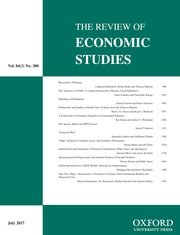
\van Wijnbergen\, S.J.G. (1991). Fiscal deficits, exchange rate crises and inflation Review of Economic Studies, 58(193):81--92.
-
Affiliated author
-
Publication year1991
-
JournalReview of Economic Studies
This article extends earlier work on unsustainable monetary policies by endogenizing the regime switch that ultimately restores sustainability. Within this framework we analyze exchange rate based stabilization programs and shows how constraints on Central Bank borrowing during an exchange crisis influence timing and nature of the post-collapse equilibrium. Such constraints introduce non-neutralities; more restrictive pre-collapse credit policies increase the post-collapse inflation rate. External shocks can destroy consistency between fiscal programs and inflation targets, causing reserve losses, exchange rate changes and higher inflation. Balance of Payments crises are the mechanism through which fiscal imbalances translate into higher inflation rather than an alternative explanation of it.